Perry And Cain On The Spot In Tonight’s Debate
Two candidates face a test tonight.
After a month in which his debate performances, and his policy positions, quite clearly led to his downfall as Republican frontrunner, tonight’s Republican debate at Dartmouth College has Rick Perry on this spot:
With $15 million in the bank and a super PAC in the wings, it’s clear Rick Perry has the cash he needs to go the distance in the GOP presidential race.
But if Perry can’t improve his performance at the next two debates, all that money may be for naught.
The Tuesday evening forum at Dartmouth College and another next week in Las Vegas offer the Texas governor an opportunity to rebound from a pair of poor debate appearances last month – but they also pose the most serious threat to his candidacy yet.
If Perry stumbles again, coming off as inarticulate or defensive, the damage to his campaign could prove terminal. One bad debate turn for a new candidate may be excusable, but two is troubling. To turn in three or even four weak showings would be more than sufficient to send donors and voters alike scurrying away for good.
The Texan is taking steps to bolster his preparations. After previously just walking through issues with a few longtime aides – typically chief strategist Dave Carney and policy director Deirdre Delisi – Perry has brought in additional help, said a source familiar with the planning. And, as The New York Times reported Monday, he’s now practicing against someone playing the Mitt Romney role. Some in Perry’s orbit still worry, however, that he’s not spent enough time getting ready for the forum. He had time carved out Monday for practice but had an intense schedule of retail events and private meetings in Washington and Iowa over the weekend.
Tuesday’s New Hampshire debate will mark Perry’s fourth since getting in the GOP contest – matching the total number he’s done in his decade as Texas governor – and it’s his most important yet.
Steve Kornacki agrees
Perry’s candidacy seems to be at a pivot point: Will he bounce back, assuage all of the concerns he’s raised among conservative leaders and activists and reassert himself as the right’s chief alternative to Romney? Or will things go from bad to worse, with Perry permanently marginalized as just one of several Romney alternatives? The week we are now starting, which will feature the first debate since his Orlando debacle and a major Perry speech on the economy, may be crucial in determining which direction he goes.
Certainly the opportunity for a comeback is there. This GOP race has been marked by unusual, even absurd, volatility. Every candidate except Santorum has had at least one burst of encouraging polling news, so there’s no reason that Perry can’t go from an early fall meltdown to a surge back to the top. After all, John McCain pulled something similar off last time around, returning from the dead in early December and walking off with the nomination. Plus, for all of his recent woes, Perry did manage to raise $17 million in the third quarter, money that makes a resurgence that much more plausible. (In fact, the New York Times reported late Sunday night that Perry is preparing to invest in television ads that will emphasize “Romney’s lack of consistency on the issues of most importance to conservatives.”)
That’s why this week’s debate, set for Tuesday night, is so significant. Deflect immigration questions and attack Romney’s conservative credentials with dexterity, and the same conservative opinion-shapers who have been turning on Perry might change their minds, leading to a broader reassessment by the rank-and-file masses who have been deserting him in polls. According to the Times, Perry’s team has been pushing him to get more sleep at night in an effort to guard against a repeat of Orlando.
The good news for Perry is that tonight’s debate is supposed to be limited economic issues, meaning that he’ll probably avoid questions about Rev. Jeffers and the whole Mormonism debate, Gardisil, and maybe even immigration. To the extent that Perry has a strong suit in these debates, at least as far as the GOP base is concerned, it’s on economics and job creation, so this may help him. Of course, the first rule of debate formats is that there are no rules about debate formats, so this is all within the discretion of the moderation, PBS’s Charlie Rose.
One can hardly believe that the Perry campaign isn’t aware of the fact that all eyes will be on their candidate after the past month of mis-steps, and done whatever they can to prepare him for it. It’s analogous in some ways to the situation that Ronald Reagan faced between the second and first debates in 1984 when the story for nearly a week was whether or not Reagan would be able to dispel the impression created by a bad first debate. When he did, the election was essentially over. The same thing won’t happen for Perry, of course, but one has to believe that he’s walking in there with instructions drilled into his head and the hope that, by this time tomorrow, we’re talking about the resurrection of Rick Perry.
The other person who will be in the spotlight in a way he hasn’t been before is the new co-frontrunner, Herman Cain:
If Cain’s top-tier status is without question, what he will do with it in tonight’s debate is very much up in the air.
Cain can be a dynamic presence with his rhetorical gifts and ability to turn a phrase. But he can also fall too much in love with his knack for candor. Remember that Cain asserted he wouldn’t let a Muslim serve in his presidential cabinet during the last debate in New Hampshire. He later recanted.
“Some folks think Herman Cain is merely a good talker and the flavor of the month. Wrong,” said Curt Anderson, a media consultant who worked for the former Godfather’s Pizza CEO during the 2004 Senate primary in Georgia. “This guy is the real deal, he has the courage of his convictions, he has integrity, and he knows what he believes.”
What does Cain need tonight to ensure that he isn’t forgotten by the time the next debate rolls around?
Sound smart on the economy, said Georgia-based Republican consultant Paul Bennecke. “He needs to provide substance and explain how his plan will fix the economy and create jobs,” explained Bennecke. “If he can do that, then he might remain a relevant part of the campaign.”
Republican voters seem ready to believe Cain knows what he is talking about when it comes to the economy. In a new Post-Bloomberg national poll, 20 percent said he would do the m,ost to improve the economy — just behind Romney who led the way with 22 percent.
Cain has done well — generally — in the debates so far, but he has never had to deal with the level of scrutiny from both the moderators and his opponents that will come his away tonight.
Asked about that raised level of scrutiny in an interview with Christian Broadcasting Network’s David Brody on Friday, Cain responded: “When they ask me who’s the president of Ubeki-beki-beki-beki-stan-stan, I’m going to say, ‘You know, I don’t know. Do you know? And then I’m going to say, ‘How’s that going to create one job?'”
Um, OK.
What Cain does with his moment tonight will determine whether this is the beginning of a long run at (or near) the top of the field for him, or the beginning of the end of his moment in the spotlight.
As Ed Morrissey notes, Cain arguably also benefits from the fact that tonight’s debate is focused on the economy since he seems to have a message that the base likes, even though, as Jennifer Rubin notes, nobody has bothered to really look at the details of his “9-9-9” plan:
The normal lines of attack against Cain — he’s never won an election, he doesn’t know anything about how Washington operates, etc. — would only endear him to the Tea Partyers. Perry can’t very well boast that he knows more about foreign policy than Cain does. Bachmann isn’t about to make the case that she knows how to get things done in D.C. So where is Cain vulnerable to criticism?
Sometimes the obvious line of criticism is the most compelling. Cain’s 9-9-9 plan is, his critics say, ill-conceived and dangerously naive. I spoke at length yesterday to Rich Lowrie, the “wealth management” consultant who has crafted Cain’s plan. It wasn’t always easy to get straight answers from him, but I learned a number of things that frankly aren’t going to play that well to voters.
His 9 percent sales tax has already been criticized by Santorum and conservative tax gurus. Lowrie says that the tax would have no exemptions. That means food, rent, everything would be subject to the tax. But doesn’t this sock it to the poor and middle class?
Lowrie insists it doesn’t because other “embedded” taxes (corporate taxes, payroll taxes) would be repealed. But most experts think the math here doesn’t work. Lowrie is unconcerned about the enforcement issues and the potential for off-the-books transactions. He insists that, with only a 9 percent rate, we could largely rely on “voluntary compliance.” He insists that politicians would find it hard to raise the sales tax because the rate would be clear to everyone. (Spoken like someone who’s never had a conversation with congressional Democrats.)
Cain’s plan is also vulnerable on the income tax side. After fencing with me for some time, Lowrie acknowledged that Cain didn’t care about progressivity. In devising the plan, Cain aimed for aimed for simplicity, transparency, and “fairness” (in the “Webster definition” sense, he says, meaning that income is taxed the same for everyone).
Lowrie says it’s just “Washington thinking” to look at whether modest-income Americans will wind up shouldering much more of the tax burden. He repeatedly refused to say how much more of the tax burden would be borne by the poor and middle class than under the current system. But he implicitly acknowledged the problem by saying that the campaign would “fix this” with a new empowerment-zone plan that would be laid on top of the 9-9-9 plan and would presumably lower taxes in inner cities. But how fair is that to people living elsewhere? And aren’t we back to more complexity?
The question is whether, and when, Cain is going to be called to defend this plan of his beyond repeating the same slogans over and over again. My guess is that we won’t see it tonight, and that Perry is more likely to be the target of attacks from the other candidates if only because they think they might be able to deliver the fabled kill shot. But Herman Cain is near the top now, and he’s not going to be able to escape scrutiny for much longer. Whether it comes tonight, or later, it will come and I think that’s when we’ll see his star begin to fall.
If you’re interested, the debate begins tonight at 8pm Eastern on Bloomberg Television. And is also being streamed live at Bloomberg.com and The Washington Post’s website.
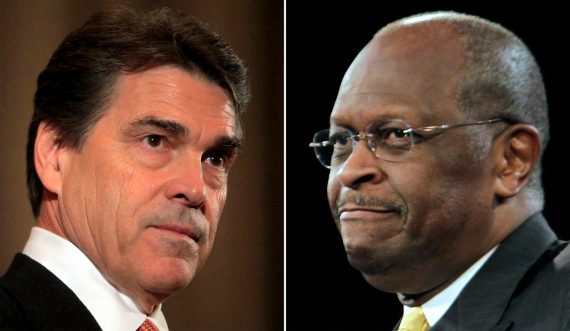

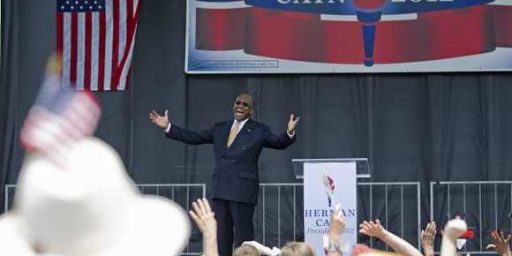

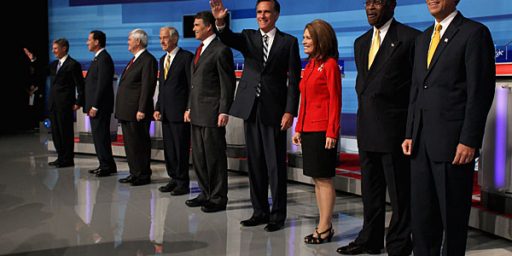
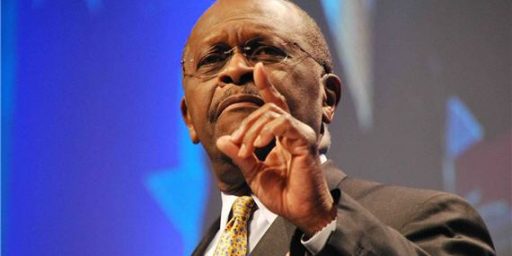
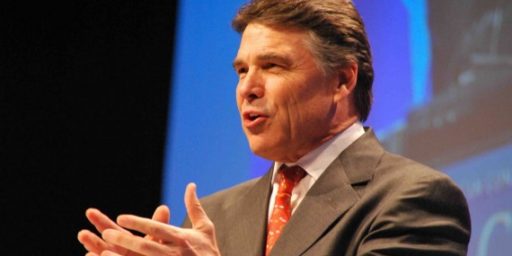
Perry and Cain are done.
The establishment has spoken through the Christie endorsment.
Romney is your GOP candidate.
Good luck all you folks in tricorns…you’ve been ignored again.
Thanks for posting the sites the debate will be streaming from.
I think there is more interest in this debate than others, as it seems to be a “do or die” one for some, particularly Perry, and maybe even Bachmann. Supposedly Perry has been doing debate prep, even having a Romney-type stand in which to sharpen his technique.
As for Cain, lack of funding talk seems to shadow his candidacy. Pundits are saying he seems more interested in hawking his new book than putting time into his campaign. Apparently, he has hardly been to Iowa, which is perplexing if he is really serious about being a contender.
If it comes down to who can appear the most sane, Its going to be a coil toss.
Least sane is a toss-up too!!!
@Hey Norm: The question is – who is the Republican Establishment? Is it Karl Rove or the Koch brothers. Is it Wall Street or the Tea Party? At this point I don’t know.
You know what’s sad to me?
If Perry does indeed fall, it’ll be for two reasons:
1) His left-of-the-wing views on immigration and vaccinations, and most importantly,
2) His refusal to capitulate on them, especially his insistence that people who opposed his tuition rules had no heart.
That’s stunning to me. Not because of what he said – his immigration policy is frankly the one area where I find he’s not completely repulsive – but the fact that everyone says they want a LEADER! A LEADER who will DECIDE and not back down! Then they get one, and they run screaming to someone like Mitt Romney, who’s – let’s face it – a coward.
I wonder who the public will scream at tonight? Women? Kids? Sick babies? Old people?
The ghost of Ronald Reagan misremembered.